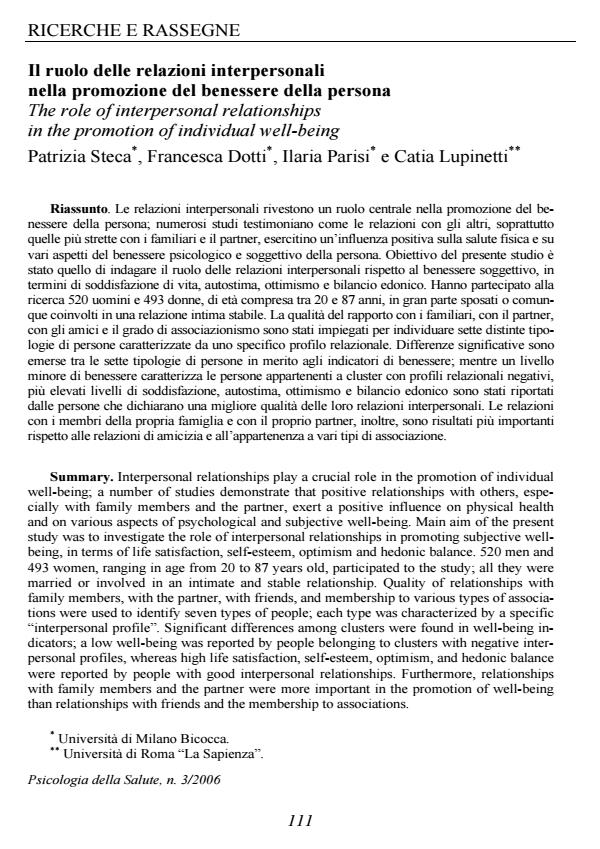Il ruolo delle relazioni interpersonali nella promozione del benessere della persona
Titolo Rivista PSICOLOGIA DELLA SALUTE
Autori/Curatori Patrizia Steca, Francesca Dotti, Ilaria Parisi, Catia Lupinetti
Anno di pubblicazione 2007 Fascicolo 2006/3 Lingua Italiano
Numero pagine 22 P. 111-132 Dimensione file 341 KB
DOI
Il DOI è il codice a barre della proprietà intellettuale: per saperne di più
clicca qui
Qui sotto puoi vedere in anteprima la prima pagina di questo articolo.
Se questo articolo ti interessa, lo puoi acquistare (e scaricare in formato pdf) seguendo le facili indicazioni per acquistare il download credit. Acquista Download Credits per scaricare questo Articolo in formato PDF

FrancoAngeli è membro della Publishers International Linking Association, Inc (PILA)associazione indipendente e non profit per facilitare (attraverso i servizi tecnologici implementati da CrossRef.org) l’accesso degli studiosi ai contenuti digitali nelle pubblicazioni professionali e scientifiche
Interpersonal relationships play a crucial role in the promotion of individual well-being; a number of studies demonstrate that positive relationships with others, especially with family members and the partner, exert a positive influence on physical health and on various aspects of psychological and subjective well-being. Main aim of the present study was to investigate the role of interpersonal relationships in promoting subjective well-being, in terms of life satisfaction, self-esteem, optimism and hedonic balance. 520 men and 493 women, ranging in age from 20 to 87 years old, participated to the study; all they were married or involved in an intimate and stable relationship. Quality of relationships with family members, with the partner, with friends, and membership to various types of associations were used to identify seven types of people; each type was characterized by a specific interpersonal profile. Significant differences among clusters were found in well-being indicators; a low well-being was reported by people belonging to clusters with negative interpersonal profiles, whereas high life satisfaction, self-esteem, optimism, and hedonic balance were reported by people with good interpersonal relationships. Furthermore, relationships with family members and the partner were more important in the promotion of well-being than relationships with friends and the membership to associations.;
Patrizia Steca, Francesca Dotti, Ilaria Parisi, Catia Lupinetti, Il ruolo delle relazioni interpersonali nella promozione del benessere della persona in "PSICOLOGIA DELLA SALUTE" 3/2006, pp 111-132, DOI: